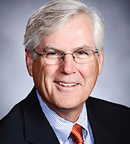
David Scadden, MD
The American Society of Hematology (ASH) will honor David Scadden, MD, of Massachusetts General Hospital and Harvard Medical School, with the 2016 E. Donnall Thomas Lecture and Prize for his work on the bone marrow hematopoietic microenvironment. This lectureship and prize is named after the late Nobel Prize laureate and Past President of ASH E. Donnall Thomas, MD. The E. Donnall Thomas Lecture and Prize recognizes pioneering research achievements in hematology that represent a paradigm shift or significant discovery in the field.
Dr. Scadden will present his lecture, “Bone Marrow: Structure and Function of the Blood Cell Foundry,” at the 58th ASH Annual Meeting and Exposition in San Diego, California, in December 2016. His lecture will focus on the progress that has been made in understanding the components of bone marrow, the logic that underlies bone marrow function, and how bone marrow contributes to blood diseases and their treatment.
Work in Bone Marrow and Stem Cell Transplantation
Dr. Scadden, Professor of Medicine and Chair of the Department of Stem Cells and Regenerative Biology at Massachusetts General Hospital and Harvard University, has focused his studies on bone marrow and stem cell transplantation. Among his most important scientific discoveries, Dr. Scadden demonstrated that the bone marrow microenvironment can be the cause of myelodysplasia and acute myeloid leukemia (AML).
In this landmark study, published in the journal Nature1 in 2010, he demonstrated that a single genetic lesion in a specific subset of cells in the bone marrow in mice can result in a myelodysplastic phenotype and the emergence of AML. Dr. Scadden also coauthored a study on the first experimental evidence of a stem cell niche in mammals. In his other work, he defined the functional microanatomic architecture of the bone marrow, showing how specific subsets of cells position themselves in the marrow and how oxygen is distributed.
Roles and Honors
Dr. Scadden founded and leads one of the nation’s first regenerative medicine centers, the Center for Regenerative Medicine at Massachusetts General Hospital. He also co-founded and co-directs the Harvard Stem Cell Institute, the largest stem cell research and therapeutic development program in the world.
He is a member of ASH and has served on several ASH committees, including as the current Chair of the Publications Committee. Dr. Scadden has served in leadership roles for the International Society of Stem Cell Research and the International Society for Experimental Hematology. He is also an elected member of the National Academy of Medicine, the American Academy of Arts and Sciences, the Association of American Physicians, and the American Society for Clinical Investigation. He has served on the Board of Scientific Counselors for the National Cancer Institute; the Board of External Experts for the National Heart, Lung, and Blood Institute; and on the advisory boards for many medical and stem cell centers around the world. He has served on numerous editorial boards, including Cell Stem Cell; Blood; Stem Cells; and Stem Cell Reports.
Dr. Scadden is the recipient of many prestigious awards. His most distinguished awards include ASH’s William Dameshek Prize, the Doris Duke Innovation in Clinical Research Award, the Gerald and Darlene Jordan Professor of Medicine Chair at Harvard, and honorary doctorates from Lund University and Bucknell University.
Dr. Scadden graduated from Case Western Reserve School of Medicine. He completed his internship and residency at Brigham and Women’s Hospital before joining the faculty of Harvard Medical School. ■
Reference

